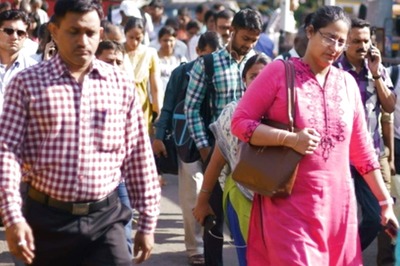
views
The Supreme Court on Wednesday set aside a verdict of the Delhi High Court which had asked Delhi Police Commissioner to appoint four youths having past criminal history as constables in the force. The Delhi Police had challenged the verdict of the high court which had quashed the order rejecting their appointment. Allowing the appeal filed through the police commissioner, a bench of Justices K M Joseph and S Ravindra Bhat disagreed with the findings of the high court that the candidates were from rural background and it cannot be said that their conduct involved moral turpitude.
It said that the High Court's approach which is evident from its observations about the youth and age of the candidates appears to hint at the general acceptability of behaviour which involves petty crime or misdemeanour. The impugned order indicates a broad view that such misdemeanour should not be taken seriously, given the age of the youth and the rural setting. This court is of opinion that such generalizations, leading to condonation of the offender's conduct, should not enter the judicial verdict and should be avoided, the bench said.
It said that certain types of offences, like molestation of women, or trespass and beating up, assault, causing hurt or grievous hurt, (with or without use of weapons), of victims, in rural settings, can also be indicative of caste or hierarchy-based behaviour. Each case is to be scrutinized by the concerned public employer, through its designated officials- more so, in the case of recruitment for the police force, who are under a duty to maintain order, and tackle lawlessness, since their ability to inspire public confidence is a bulwark to society's security, it said.
The bench said that public service – like any other, pre-supposes that the state employer has an element of latitude or choice on who should enter its service. Norms, based on principles, govern essential aspects such as qualification, experience, age, number of attempts permitted to a candidate, etc. These broadly constitute eligibility conditions required of each candidate or applicant aspiring to enter public service. Judicial review, under the Constitution, is permissible to ensure that those norms are fair and reasonable, and applied fairly, in a non-discriminatory manner, it said.
The top court said, however, suitability is entirely different and the autonomy or choice of the public employer is greatest, as long as the process of decision making is either illegal, unfair, or lacking in bona fides. Courts exercising judicial review cannot second guess the suitability of a candidate for any public office or post. Absent evidence of malice or mindlessness (to the materials), or illegality by the public employer, an intense scrutiny on why a candidate is excluded as unsuitable renders the courts' decision suspect to the charge of trespass into executive power of determining suitability of an individual for appointment, it said.
The top court examined the criminal cases against each candidate, which had later resulted in compromise, compounding of offences or acquittal on the ground of insufficient evidence. The candidates, who have applied for the post of constable in Delhi police, had declared the criminal cases instituted against them and the outcome of these cases in the application form. One of the candidates was booked for kidnapping of her husband; another was booked for voluntarily causing hurt and wrongful restraining a person, unlawful assembly. One other candidate was booked for voluntarily causing grievous hurt while the last one was booked for house trespass and other offences. However, in all the four cases, except for the kidnapping case, the offences were compounded after the parties reached compromise.
The candidates have claimed that the Screening Committee dealt with their cases in a perfunctory manner and did not appreciate the entirety of facts. They relied upon the observations of the High Court that in cases involving allegations of commission of offences under Section 323 IPC, especially where the offenders were youth from rural backgrounds, it cannot be said that the conduct involved moral turpitude and that the Courts should be alive to the realities that in such areas, brawls and fights are common place.
Read all the Latest News, Breaking News and Assembly Elections Live Updates here.




















Comments
0 comment